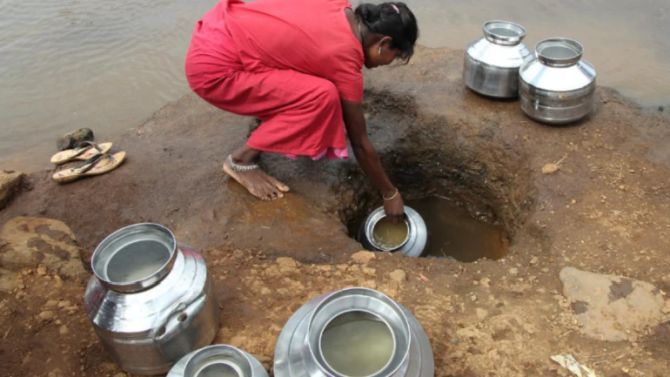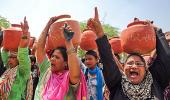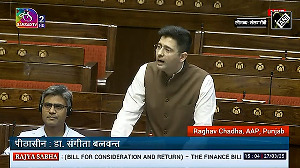As one of the fastest urbanising countries in the world, Indian cities would continue to lurch from one water crisis to another if we only woke up during emergencies. Responses that merely deal with the symptoms of acute water crises cannot fix chronic water mismanagement, says Arunabha Ghosh.

In May 2014, Cape Town’s major dams and reservoirs were at 72 per cent capacity.
By May 2017, after three years of drought, levels were down to 21 per cent.
By October only five months of water was left in storage.
The city declared an impending “Day Zero” when water taps would be turned off and residents would have to go to public water distribution points.
The declaration triggered panic -- but also action.
A series of water efficiency measures ensured that Cape Town’s total water demand fell from 600 million litres per day (mld) in mid-2017 to 507 mld by April 2018 (short of the 450 mld target but significant nonetheless).
In June 2018, authorities postponed Day Zero indefinitely.
Chennai’s experience is not dissimilar to Cape Town’s.
In 2015, it was hit by a once-in-a-century flood.
Thanks to three subsequent years of below-average monsoons, water levels in its four reservoirs kept dropping, down to 1 per cent by May 2018.
But authorities reacted late with no concerted effort to reduce water demand.
Last year, Shimla had to turn away tourists because water levels were dangerously low, once again a consequence of less rain and falling water levels, leakages in pipelines, and unchecked urban growth.
As one of the fastest urbanising countries in the world, Indian cities would continue to lurch from one water crisis to another if we only woke up during emergencies.
Responses that merely deal with the symptoms of acute water crises cannot fix chronic water mismanagement.
Constant campaign: India’s cities need a constant campaign to explain -- and change -- the use, misuse and reuse of the critical resource.
The right to water is a right to a minimum amount of water for basic human needs.
It is not a right to profligate or inefficient use of water.
We face two kinds of communication challenges.
One, how not to create a sense of overconfidence that solutions will emerge automatically.
Reliance on water tankers, water trains or water desalination plants is myopic and inadequate unless consumption behaviour changes.
The other challenge is how to not create a sense of despair when talking about too much or too little water.
Both communication problems persist because we have failed to empower individuals and communities.
This is what Cape Town did.
The “Zero Day” announcement jolted people out of their apathy and nudged a series of household-level actions: Using buckets in showers to reuse the extra water, recycling washing machine water, or flushing toilets once a day.
Poorer residents in shantytowns had been used to such practices for years.
It was the sight of rich residents queuing up for water that conveyed that something was seriously wrong -- and had to change.
Measure, recharge, then build: Each urban area and its associated watershed have a carrying capacity.
Metropolitan Chennai with 8.6 million people has a daily demand of 1,200 mld in normal times.
Cape Town, at half the population, managed far lower total demand after its water crisis.
It is imperative that we measure water availability and water consumption.
Only then would water recharge measures (harvesting rainwater, rehabilitating lakes or desilting canals) prove effective.
More importantly, measurement should happen at a micro level (homes, offices, industries and farms).
Building permits in cities should not be issued unless developers have demonstrated that they have installed systems to recharge more water than what is expected to be withdrawn.
The same applies for flood management plans before new developments are sanctioned, as was done in California’s Central Valley.
Bureau of Water Efficiency (BWE): For existing users, 20 per cent increase in water use efficiency must be mandated for all sectors.
Water conservation will not work only by force of moral suasion or regulatory diktat.
A Bureau of Water Efficiency should be tasked with designing and implementing mechanisms for year-on-year improvements in water efficiency by creating positive incentives.
Incentives linked to price are easier but not always politically palatable.
Other mechanisms are possible: Water efficiency labels for appliances; bulk purchase of water-saving devices to lower costs; or a water credit trading system among industries.
Agriculture (which consumes more than 80 per cent water in India) cannot be exempted.
Water savings could be linked to farm output and farmers’ incomes.
The proposed BWE could adopt standards and labelling of drip irrigation systems and support end-user financing to promote efficient farm equipment.
Circular economy of water: More than 20 years ago, Singapore began R&D on reclaiming treated sewage water to potable standards.
NEWater, the brand name given to reclaimed water, can now supply up to 40 per cent of Singapore’s water demand, compared to 25 per cent from desalination plants.
Eventually, an economic case for water conservation is needed. Most of the urban sewage in India goes untreated.
If all sewage were treated, water could be reused to cool down power plants (the biggest guzzlers after farms) and minerals recovered could be used as fertiliser.
A circular economy of water allows for each drop to be used many times over and reduces the tariffs necessary to make sewage treatment plants economically viable.
What initially was just a cost can become a resource to generate revenue.
Risk and vulnerability are not the same. Insufficient rains, climate-related stresses, bad urban planning have increased water risks for our bustling cities. But episodic water crises will only trigger action when citizens (poor and rich) find their vulnerabilities exposed.
From Cape Town to Chennai, the lesson is clear: When we endure the agony personally, we are also likely to register the urgency. Then, we might just wake up.
Arunabha Ghosh is CEO, Council on Energy, Environment and Water.
Photograph: Reuters












 © 2025
© 2025